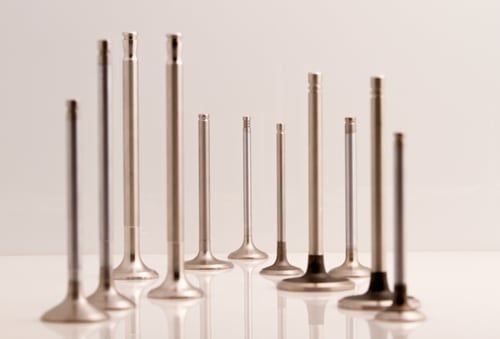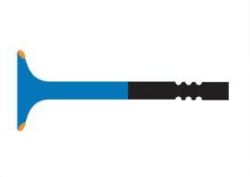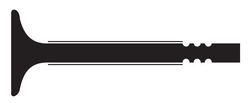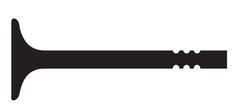ENGINE VALVES
With over 30 years of experience STYM manufactures internal combustion engine valves. In an internal combustion engine there are two types of Valves, the Intake valve which lets the fuel and air mixture in to the cylinder and the Exhaust valve which lets the aftermath of the fuel combustion evacuate the cylinder. This is a continuous process in the engine.At STYM, we manufacture different types of Intake and Exhaust valves for different purposes, engines and designated solutions. These products designated solutions range are as follows:
- AUTOMOTIVE
- LOCOMOTIVE
- MARINE
- INDUSTRIAL & ENERGY SECTOR
- HEAVY DUTY MACHINERY
The engine valves for each designated solution and each order based on the request of the customer can manufactured in different variety using specialised processes. In the Following are the varieties of specialised products STYM can manufacture based on the customer’s request.

Monometallic Engine Valve

The regular alloy material used for manufacturing valves consist of two types of steel, Austenitic steel and Martensitic Steel. Depending on the engine sustaining the valves, these valves can be magnetic or non magnetic. The Monometallic Engine Valve is a type of valve which is manufactured with only one type steel alloy material.
Bi-Metallic Engine Valve

Bi-metallic valves are engine valves that are manufactured using two different metal alloys. The process is commonly used for exhaust valve. The two different alloys are joined together using a technology called friction welding. In these types of valves the head of the valve is made of Austenitic Steel which has better heat resistance and corrosion resistance properties and also it does not have magnetic properties and the stem of the valve is made of Martensitic Steel which has high tensile strength, abrasive wear resistance properties and magnetic properties.
Hard-Faced Engine Valve

Hard-Faced Engine Valves are type of engine valves which the seat area of the valves are armoured using commonly a cobalt based alloy deposit using PTA Welding technology. This process will increase the valve seat wear and high temperature resistance.
Chromium Plated Engine Valve

Chrome plated Engine Valves are manufactured by Electroplating Chromium on the stem of the valve which will result in high durability in the valve itself and increases stem resistance.
Nitrated Engine Valve

Nitrating is hardening process which coats a layer on the engine valve which on the end product it will appear as a dark metallic or black coated valve. In the nitrating process the coated layer increases the deterioration and corrosion resistance. In this process the whole valve is coated with nitrite layer and also there is microscopic layer of penetration to the base material which will increase durability properties and decrease stickiness of the valve which prevents it from breaking in case of bending due to the impacts with the pistons.
Hollow Sodium Filled Engine Valve

Hollow Sodium Filled Engine Valve is a Hollow stem valve filled with a metallic sodium that turns in to liquid when exposed to high temperatures (Heat Dissipation). This type of valves are used in high performance turbo charged engines as the sodium melts and circulates through the hollow stem carrying away the heat of the engine from the head of the valve, thus from the combustion chamber.
Nimonic Engine Valve
Nimonic 80A alloy is a wrought, age-hard enabled nickel-chromium alloy, strengthend by additions of titanium, aluminium and carbon. This alloy is developed for service and withstand temperatures up to 815°C (1500°F). The Nimonic 80A alloy is used in the production of mainly exhaust engine valves. The applications of Nimonic engine valves are mostly in industrial high performance engines.
Inconel Engine Valve
Inconel Alloy is a precipitation hard enabled nickel-chromium alloy, which is mainly used for exhaust valve production. For exhaust valve manufacturing material evaluation, Inconel alloys have performed well in a 913°C lead oxide screening test. Inconel alloy material has shown and offered a good result with corrosion resistance. The Inconel engine valves can resist the impurities such as sulphur which contains in the exhaust stream.
